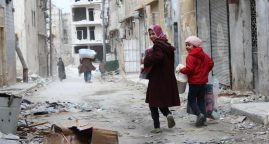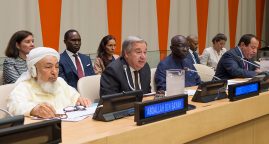Should the UN surrender over peacekeeping?
The failure of UNMISS in South Sudan is a blow for international peace
The bitter criticism heaped on UN peacekeepers in South Sudan this month over their failure to act to protect civilians and humanitarian workers is sadly nothing new. But it is now raising an urgent question: is the UN’s peacekeeping system fit for purpose?
In early 2014, shortly after the outbreak of South Sudan’s brutal civil war, officials at the UN’s Department of Peacekeeping Operations were feeling the pressure over their ability to protect more than 60,000 South Sudanese displaced by the violence that were sheltering in UN camps. It was, then, an unprecedented number.
“We cannot protect those people from being overrun while at the same time doing patrolling in an area the size of France,” Kieran Dwyer, the spokesperson for DPKO said at the time. It wasn’t the job of peacekeepers, he continued, “to stand in the way of the anti-government forces fighting the pro-government forces.”
Dwyer was speaking shortly after the Security Council had authorised the enlargement of the mission in South Sudan, UNMISS, from 7,000 to 12,500 troops. Even with 5,500 new blue helmets on the way, he was clear about how limited their role could be. Despite possessing a Chapter VII mandate, authorising the use of deadly force, DPKO said its soldiers were ill-equipped to save lives in the midst of a civil war.
“The primary responsibility to protect civilians is with the government, and our job is to support the government,” said Dwyer.
This month, following fighting in the capital Juba that left hundreds dead and countless victims of sexual violence, the UN Security Council voted once more to enlarge UNMISS. On 12 August, diplomats approved a 4,000-strong Regional Protection Force, mandated to facilitate movement in Juba, protect its airport, and engage with “any actor” believed to be preparing or undertaking attacks on the UN, international actors, and civilians.
Its deployment – the terms of which, as well as the troops’ exact makeup, when they will arrive, or even where they will be housed, remains very much up in the air – is meant to give the UN a force that can intervene in ways the 13,000 peacekeepers already on the ground have been unwilling or unable to.
The Security Council’s decision to deploy the protection force comes largely in response to violence waged by the government that UNMISS was originally meant to cooperate with – underscoring just how delicate and potentially explosive its presence could be.
It also speaks to the changing environment that UN peacekeepers find themselves in: from Mali, where peacekeepers battle Islamist insurgents; to the eastern Congo, where they track down rebels in collaboration with government forces that have a gruesome record of human rights abuse; to Darfur, where they’ve remained bogged down for years, and faced accusations of covering up crimes committed by the government, including some carried out against peacekeepers.
Outdated model?
What happens in South Sudan could offer a window into what role UN peacekeepers can play in the future: whether they can really protect civilians in the midst of war; or if the UN is too slow, too risk-averse, and whether it should instead outsource peace enforcement to regional organisations working under UN authorisation.
The fighting that broke out on 8 July between forces loyal to President Salva Kiir and opposition leader Riek Machar left a peace agreement in tatters. It had briefly ended two years of conflict between the armies of both men that had left over 100,000 people dead, offering a new government of national unity in which Machar was sworn in as vice president. He is now in exile, and what happens next is far from clear.
What the violence underscored was the limitations of the current UN peacekeeping model. As forces loyal to both Kiir and Machar battled it out in Juba, Human Rights Watch found that mortars and artillery had been fired “at or above” Protection of Civilian (PoC) sites, in clear disregard of the lives of the people sheltered there, and in a direct challenge to the UN.
According to investigations published in the Associated Press, dozens of Nuer women – Machar’s ethnic group – were raped “just outside” a UN camp where they had fled to seek shelter amid the fighting. Several witnesses said Chinese and Nepalese peacekeepers watched as soldiers dragged a woman away.
The July violence came just weeks after a UN Board of Inquiry completed its investigation into peacekeeper inaction during a government-orchestrated attack on a PoC camp in Malakal in February that left 30 displaced people dead. Malakal and the failings in Juba represent something of a pattern by UNMISS.
The peacekeepers can “only protect a small proportion of Sudanese civilians at the best of times – those in or near the PoC sites – and at worst, it cannot protect civilians in the PoC sites,” said Paul Williams, professor at George Washington University and expert in international peace operations.
“This is a very hard ask of troop or police contributing countries, many of whom will not want to die for the UN in South Sudan.”
The July violence in Juba was testament to that. AP reported that foreign aid workers were raped and assaulted less than a mile from where peacekeepers were stationed, when as many as 100 government soldiers, some reportedly drunk, descended on the Terrain hotel compound on 11 July.
Despite repeated and frantic calls to the UN, hours passed and no peacekeepers were ever sent. Aid workers watched as a Nuer journalist was summarily executed; one humanitarian worker said she was raped by 15 soldiers. The terror only came to an end when the US embassy contacted the government, which dispatched a rapid-reaction force.
Ignoring the facts on the ground
“The problem from the outset is that the international community had a hard time divesting itself from the fairytale story that it wanted South Sudan to be,” said Charles Petrie, former UN assistant secretary general and recently a member of the Group of Experts designated by Secretary General Ban Ki-moon to review UN peace-building efforts. “As a result, the multiple signals that contradicted that narrative were completely ignored.”
The US, which pushed this month’s resolution through the Council in less than a week, ultimately elected to hold off, yet again, on the inclusion of an arms embargo in the text – an element that Ban, peacekeeping officials, and several key allies have called for.
That hesitancy is reportedly a product of senior holdouts in the Obama administration, namely current National Security Advisor Susan Rice. Rice was UN ambassador when South Sudan became independent in 2011, and is close to many in the country’s elite. A principal concern of the Americans is that an arms embargo would prevent the government from defending itself against the rebels, who could continue to receive arms from abroad, including Sudan. After the violence perpetrated in Juba, even Washington’s closest allies were having nothing of that argument.
“Today, we also had a chance to stop the violence, by implementing an immediate arms embargo on South Sudan,” said British deputy ambassador, Peter Wilson. “On that, we failed.” The resolution, said France’s representative, “should have gone all the way by imposing immediately an arms embargo.”
One peacekeeping official was even more explicit. “The firepower in the hands of the SPLA thanks to the absence of an arms embargo is overwhelming in terms of its superiority to what the mission has,” said the official, who spoke on condition of anonymity.
According to recent analysis carried out by the Small Arms Survey, an embargo would in particular impact the fearsome Mi-24 attack helicopters the government has in its inventory, as the foreign contractors that keep them flying would be outlawed.
But it wouldn’t be a silver bullet. UNMISS claim they are routinely prevented from patrolling by government roadblocks, or by Juba merely declaring an area unsafe. In the Malakal attack, peacekeepers inexplicably sought “written authorisation” to engage with forces attacking a camp there that housed some 40,000 displaced people.
“An arms embargo is a missing piece of the bigger puzzle, but it’s not going to fix peacekeeper underperformance,” said Akshaya Kumar, deputy UN director at Human Rights Watch.
The need for alternatives
For Petrie, there’s a larger question at stake in South Sudan: whether peacekeeping, and more of it, is the solution to an intractable and bloody conflict – one that is a low priority for world powers.
“The overarching concern is that UN peacekeeping would increasingly seem to have become the default response for conflicts of secondary concern to the permanent members of the Security Council,” said Petrie. “In a way, it’s a reflection of the rapid decline of multilateralism, which since 9/11 has been replaced by coalitions ‘of the willing’.”
Indeed, while four of the council’s five permanent members – save China – are bombing Islamists in Syria or Iraq, in South Sudan, they instead authorise forces made up of troops primarily from poorer countries.
South Sudan’s government initially rejected the regional intervention force. If it maintains that position, it’s unlikely the deployment will take place. Few can imagine the UN fighting its way into Juba.
The closest relative to the proposed regional protection force is the force intervention brigade (FIB) which the UN deployed in the eastern Democratic Republic of the Congo to track down rebel groups. But in the DRC, the UN enjoyed the official support of the government.
Williams, who has for years analysed the UN’s varied peacekeeping responses, says the regional force falls into a growing trend of deployments, including in Darfur and Burundi, where the host government refuses to cooperate. In Burundi, the government eventually only accepted a small police force, and the UN’s mission in Darfur has been one of its most scandal-plagued.
“The protection force is not a real solution to the core problem,” said Williams. “Military force that is not part of a viable strategy to resolve the conflict and move towards stable peace can only mitigate the worst symptoms of South Sudan’s toxic elite politics.”
Five years after South Sudan became independent, there is little to show for all that initial hope. Development indicators are in reverse, the humanitarian crisis is growing exponentially, and a corrupt political class has shown little enthusiasm to bridge the divides that took the country back into war.
Read the article on IRIN website
Related Articles
Turkey steps up crackdown on humanitarian aid groups
04/27/2017. Turkish authorities have detained 15 staff of a US NGO working on Syria relief operations – the latest in a series of moves restricting humanitarian aid groups in the country.
A framework to underpin action to prevent violence against women
Violence against women is one of the most pervasive human rights violations in the world, rooted in gender inequality, discrimination and harmful cultural and social norms
Faith central to hope and resilience, highlights UN chief, launching initiative to combat atrocities
07/14/2017. “Let us work together to prevent and end atrocity crimes and all affronts to human rights and dignity,”António Guterres






